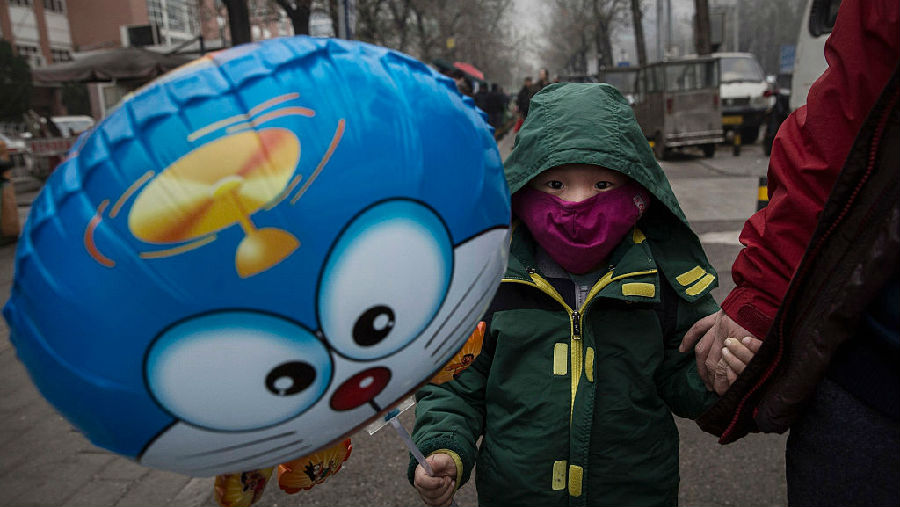(单词翻译:单击)

Shopping malls in China’s smog-bound capital are vying for customers by advertising the quality of their indoor air, as weeks of choking winter pollution keeps families indoors.
在中国雾霾笼罩的首都北京,商场正通过宣传它们的室内空气质量有多么好来争抢顾客,因为数周以来令人窒息的冬季空气污染让许多家庭选择足不出户。
Chinese malls rely heavily on children’s play areas, restaurants and even gimmicks such as polar bears to lure shoppers, in a highly competitive sector plagued by massive overbuilding. That poses a problem on days when hazardous air quality keeps families with small children at home, leading many malls to turn to cleaner air as a selling point.
受到严重的过度建设困扰,中国零售业的竞争相当激烈,商场严重依赖儿童游乐区、餐厅、甚至北极熊这样的噱头来吸引购物者。在空气质量危害健康的日子里,有幼童的家庭选择待在家中,这就给商场制造了一个难题,导致许多商场选择把更清洁的空气作为一个卖点。
Average air quality in Beijing had improved over the past year, but a bout of thick winter smog beginning in November has had citizens, and particularly parents, griping. Air indexes have stayed stubbornly in the “hazardous” zone in the capital, while the industrial cities of the north China plain have gone off the charts for several days running.
过去一年,北京的平均空气质量有所改善,但从去年11月开始的一轮严重的冬季雾霾让民众、尤其是父母们很揪心。在北京,空气指数一直顽固地停留在“危险”区,而华北平原的工业城市已连续几天空气指数爆表。
Early in January, the national observatory issued its first-ever red alert for fog across large swaths of north China. An even larger region is under orange alert for smog, after red alerts late last month forced traffic off the roads and closed some schools.
1月初,中国中央气象台在华北大部地区发布了首个大雾红色预警。启动霾橙色预警的地区范围更大。上月底发布的红色预警曾导致车辆限行和学校关闭。
China has a national standard for indoor levels of PM10, airborne particles smaller than 10 microns across, and Beijing is working on standards for PM2.5, the fine particles that pose an even greater danger to health. The city’s standards for internal air quality were originally expected to be issued in 2016.
中国已有针对室内空气PM10(空气中直径小于10微米的颗粒物)浓度的国家标准。北京市正在研究PM2.5的标准,这种细颗粒物对健康的危害更大。外界最初曾预计,北京市会在2016年发布室内空气质量标准。
But as the public becomes increasingly concerned about air pollution, high-end malls in Beijing have taken to publishing their indoor air quality on digital screens in the central atrium. Joy City, a mall developer in Beijing, announced on social media it had installed a multilayer air filter: “Let’s escape from smog and feel the beauty of the nature,” it said.
不过,随着公众日益担忧空气污染,北京的高端商场已经着手在中庭的电子屏幕上发布它们的室内空气质量。北京的商场大悦城(Joy City)曾在社交媒体上宣称它拥有多层空气过滤设施:“让我们逃离雾霾,感受自然之美。”
Wanda, a property developer with malls in most of China’s medium-to-large cities, announced a year ago it was working with Finnish air purification company AAVI Technologies to clean the air in its cinemas in Beijing. The co-operation would “enable the audience in Wanda to have a very healthy movie-viewing environment and enjoy the clean air from Finland,” AAVI said.
在全国许多大中城市建有商场的开发商万达(Wanda)曾在一年前宣布,正与芬兰空气净化公司AAVI科技有限公司(AAVI Technologies)合作,净化北京市万达影城内的空气。AAVI表示,这一合作会“让万达影城内的观众拥有非常健康的观影环境,享受来自芬兰的清洁空气”。
The malls are not alone. International schools in Beijing woo prospective parents on the quality of their air and the strictness of their guidelines for recess outside, with some building domes over tennis courts and playing fields. High-end gyms also compete on their air filtration capacity. Coffee shops post signs saying air filters are on.
商场并不是唯一这么做的机构。北京的国际学校也用其空气质量和其暂停户外活动的规定之严格来吸引潜在的学生家长,部分学校在网球场和操场上加盖了穹顶。高端健身房也在空气净化能力上展开竞争。咖啡店则张贴告示称,自己店内开着空气净化器。
This week, the city announced it would install air filters in state-run preschools, elementary schools and high schools. In some, parents have already joined forces to pay for filters themselves.
就在本周,北京市宣布会在公立幼儿园和中小学安装空气净化器。在部分学校,已有家长自掏腰包、联合出资购买空气净化器。
But a group of fed-up mothers who have checked the malls’ air quality claims have found not all the malls or shops are filtering as well as they claim.
不过,一群对商场宣称的空气质量作过检测的妈妈沮丧地发现,并非所有商场和店铺都像其声称的那样在净化空气。
“When we got the results, all of us were shocked and very disappointed. I was about to cry,” said Yan Jiangning, who set up a public social media account called Daxiaoaiwan or “Big and Small Love Playing” that rates play venues for small children. Ms Yan organised volunteers to check the air quality in 60 public spaces in Beijing in mid-December, when the outdoor quality index hovered around 500 (anything under 100 is considered good air quality). Many turned out to be little better than the air outside.
“大小爱玩”公号的创立者严江宁表示:“检测结果出来时,我们都很震惊,也很失望。我差点哭了。”“大小爱玩”是一个点评推荐亲子活动场所的社交媒体公众号。去年12月中旬,严江宁组织志愿者检测了北京60处公共场所的空气质量,当时北京市户外空气质量指数徘徊在500左右(该指数低于100被视为空气质量良好)。结果显示,许多场所的空气质量并不比户外好多少。
Their best result? The National Museum beside Beijing’s Tiananmen Square, which was recently renovated with advanced air control systems to protect the art works on display.
他们检测出的空气质量最佳的场所是?北京天安门广场旁的国家博物馆。那里最近翻修过,安装了先进的空气控制系统,以保护馆内展出的艺术品。


